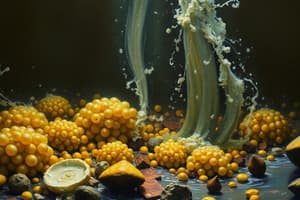Podcast
Questions and Answers
What are the consequences of not discharging metabolic wastes from living organisms?
What are the consequences of not discharging metabolic wastes from living organisms?
Accumulation of wastes can lead to toxicosis and obstruction of biological functions.
Describe the composition of feces in digestive excretion.
Describe the composition of feces in digestive excretion.
Feces are composed of undigested food materials, water, bacteria, and dead cells.
Which gases are primarily eliminated through pulmonary excretion?
Which gases are primarily eliminated through pulmonary excretion?
Carbon dioxide and water vapor are primarily eliminated through the respiratory system.
Explain the role of kidneys in renal excretion.
Explain the role of kidneys in renal excretion.
What is the primary function of the skin in excretion?
What is the primary function of the skin in excretion?
Identify the two main layers of the kidney and their color characteristics.
Identify the two main layers of the kidney and their color characteristics.
What are nephrons, and why are they important for kidney function?
What are nephrons, and why are they important for kidney function?
Describe the location of the kidneys in relation to the vertebral column.
Describe the location of the kidneys in relation to the vertebral column.
What is the significance of the pelvic cavity in the kidney?
What is the significance of the pelvic cavity in the kidney?
What role does excretion play in the balance between cells and their environment?
What role does excretion play in the balance between cells and their environment?
Flashcards are hidden until you start studying
Study Notes
Excretion in Organisms
- Waste materials result from food metabolism in unicellular and multicellular organisms.
- Accumulation of waste causes toxicosis and obstructs biological functions, necessitating excretion.
- Excretion balances the cells and environment while regulating water and salt levels.
Types of Excretion in Humans
-
Digestive Excretion:
- Involves the expulsion of feces, comprising undigested food, water, bacteria, and dead cells from the digestive tract.
-
Pulmonary Excretion:
- Carbon dioxide and water vapor are expelled through the respiratory system.
-
Renal Excretion:
- Excess water and harmful substances, such as urea, are filtered from the blood by the urinary system.
-
Skin Excretion:
- The skin eliminates excess water, salts, urea, and small amounts of carbon dioxide.
Structure of the Urinary System
-
The urinary system carries out renal excretion, primarily involving the kidneys.
-
Kidneys:
- There are two bean-shaped kidneys located on either side of the vertebral column in the abdominal cavity.
- Each kidney is surrounded by a thin membrane called the capsule.
- Kidneys consist of two main layers:
-
Cortex:
- The outer layer, red in color, containing microscopic filtering units known as nephrons.
-
Medulla:
- The inner part, bright-colored and striped, housing many urinary tubules.
- Contains the renal pelvis, which is the cavity at the center and the starting point of the ureter.
-
-
Circulation:
- Renal arteries supply blood to the kidneys, while renal veins remove waste products.
Studying That Suits You
Use AI to generate personalized quizzes and flashcards to suit your learning preferences.




